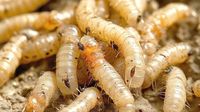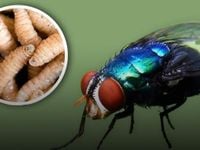The recent confirmation of the first human case of myiasis caused by the screwworm in Mexico has shocked the medical community and the general public. This case, detected in a 77-year-old woman in Chiapas, underscores the importance of epidemiological surveillance in preventing zoonotic diseases. The Ministry of Health of the country has acted swiftly, ensuring that appropriate measures are taken to treat and monitor the affected patient.
The detection occurred in the municipality of Acacoyagua, where the patient is currently under supervised medical care. According to official reports, the patient is stable and has received antibiotic treatment at the Hospital de Alta Especialidad Ciudad Salud in Tapachula. This development reflects the commitment of health authorities to provide necessary treatment for this type of infection.
Myiasis is a parasitic disease caused by the larva of the fly Cochliomyia hominivorax, which feeds on living tissue. Although it is more common in livestock, its occurrence in humans is particularly alarming. Infestation can lead to severe lesions, loss of organ function, and, in extreme cases, can be fatal. Symptoms may include fever, depression, and loss of appetite, typically associated with existing skin wounds.
In response to this situation, the Ministry of Health of Mexico has initiated immediate actions to protect the population. Training sessions on epidemiology, focusing on surveillance and control of this zoonosis, have been conducted. Personnel from the National Service of Health, Food Safety and Quality (SENASICA) are involved in these initiatives to ensure public health.
The treatment for myiasis generally involves the surgical extraction of the larva. Following this, medical care must be administered to prevent secondary infections. The prompt identification of the case and timely intervention are crucial to ensure the patient’s well-being and to prevent the spread of the disease. The recent experience in Chiapas highlights the importance of prevention and health education to avert future parasitic infections.
It is essential for both the medical community and the public to be informed and prepared to face such emerging pathologies. As the first confirmed case of myiasis in humans in Mexico, this incident serves as a wake-up call regarding the potential threats posed by zoonotic diseases.
The Secretariat of Health confirmed the first human case of myiasis caused by the screwworm Cochliomyia hominivorax in Mexico. The patient, a 77-year-old woman from Acacoyagua, Chiapas, was transferred to the Hospital de Alta Especialidad Ciudad Salud in Tapachula, where she is currently stable and receiving antibiotic treatment.
Following the detection of this case, the Chiapas State Health Services initiated an investigation to trace the origin of the contagion and contain any possible spread. The authorities are working diligently to address this unusual health threat. In coordination with SENASICA, specialized personnel have begun training in epidemiological surveillance, prevention, and control of myiasis in the affected region.
Simultaneously, an epidemiological brigade from the sanitary jurisdiction of Tapachula is conducting containment, active surveillance, and health promotion actions in the community where the patient resides as part of the protocol for such cases. The Agriculture and Health Secretariats are collaborating to minimize risks to the population and ensure an effective health response to this unusual threat.
Myiasis, a parasitic disease caused by fly larvae that invade the skin of mammals, is more commonly found in tropical regions and areas with poor hygiene. In the case of myiasis caused by the screwworm, flies deposit their eggs in open wounds, and the larvae subsequently consume the tissues, leading to pain, irritation, and foul odor. This disease can cause serious health issues, including secondary infections and deep tissue damage if not treated properly.
As of now, no additional human cases have been identified. The epidemiological brigade in Tapachula continues to carry out health promotion, surveillance, and containment actions in the locality of the woman’s residence. It is worth noting that at the end of 2024, there was an outbreak of screwworm in Chiapas, prompting authorities to request that livestock producers regularly check their animals.
To combat this issue, a sanitary inspection barrier was established for livestock in the southern part of the country to eradicate the infestation as quickly as possible. This effort was reinforced in cooperation with the Inter-American Institute for Cooperation on Agriculture (IICA) in February to prevent and control the screwworm in livestock.
The screwworm of livestock, Cochliomyia hominivorax, is the larva of a fly that causes myiasis, affecting both animals and humans. Adult females lay their eggs in wounds, mucous membranes, or damaged skin of their hosts, leading to infection. Treatment typically includes manual extraction of larvae, cleaning, the use of disinfectants, and antibiotics.
With this alarming case, the Ministry of Health emphasizes the need for vigilance and education to prevent similar incidents in the future. As the situation develops, the focus remains on protecting public health and ensuring that the necessary resources are in place to address this emerging health threat effectively.






